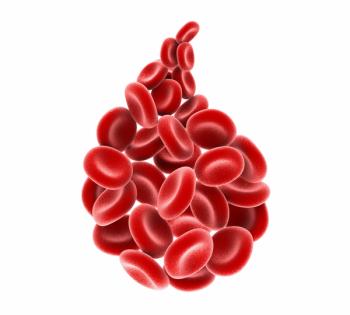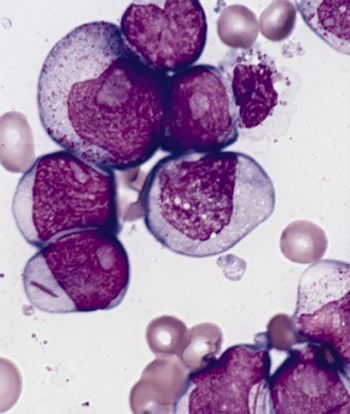
Luspatercept, the use of which is supported by results from the phase 3 COMMANDS trial presented at 2023 ASCO, is now available for patients with low-risk myelodysplastic syndrome and anemia.

Your AI-Trained Oncology Knowledge Connection!


Luspatercept, the use of which is supported by results from the phase 3 COMMANDS trial presented at 2023 ASCO, is now available for patients with low-risk myelodysplastic syndrome and anemia.

Luspatercept, which is now FDA approved for myelodysplastic syndromes, may help patients achieve transfusion independence.

Findings from the phase 2/3 IMerge trial support the new drug application for imetelstat in the treatment of patients with transfusion-dependent anemia in lower-risk myelodysplastic syndrome.

Findings from a phase 1 study highlight that ivosidenib tablets did not raise any new safety signals in the treatment of patients with IDH1-mutated relapsed/refractory myelodysplastic syndromes.

Results from the phase 3 MOMENTUM trial support the use of momelotinib as a treatment for patients with myelofibrosis, including those with anemia or thrombocytopenia.

Investigators note that although therapy-related myelodysplastic syndromes or acute myeloid leukemia are not common, efforts to reduce treatment-associated toxicity in survivors of lymphoid neoplasms are needed given the poor prognosis associated with the diagnosis.

Investigators will submit data from the phase 3 ENHANCE trial evaluating magrolimab plus azacitidine in higher-risk myelodysplastic syndromes for presentation at a future medical meeting.

Selinexor plus ruxolitinib is under investigation as a treatment for JAK inhibitor-naïve patients with myelofibrosis as part of the phase 3 XPORT-MF-034 trial.

Eltrombopag may be an effective therapy for the ‘challenging condition’ of severe thrombocytopenia in patients with low-risk myelodysplastic syndromes.

The new drug application for imetelstat is based on findings from the phase 3 IMerge trial, in which the telomerase inhibitor outperformed placebo in the treatment of transfusion-dependent anemia.

A recent analysis of patients with several different hematologic malignancies finds that vulnerable patients report having worse health-related quality of life across all measures.

Patients with highly transfusion dependent, relapsed/refractory myelodysplastic syndrome appear to have long-lasting transfusion independence and increased hemoglobin following treatment with imetelstat.

The Molecular International Prognostic Scoring System appears to improve prognostic discrimination across all clinical end points compared with other scores in patients with myelodysplastic syndromes.

Ropeginterferon alfa-2b-njft has been moved to preferred status in the National Comprehensive Cancer Network guidelines for polycythemia vera based on data supporting the agent’s superior efficacy and safety in high- and low-risk populations.

Luspatercept may lead to a paradigm shift in the treatment of patients with lower-risk myelodysplastic syndrome, according to an expert from The University of Texas MD Anderson Cancer Center.

Findings from a recent phase 1b study suggest that magrolimab plus azacitidine may be an “important addition” to the higher-risk myelodysplastic syndrome treatment landscape.

Data from the phase 3 COMMANDS trial support a supplemental biologics license application for an expanded indication for luspatercept-aamt for lower-risk myelodysplastic syndrome with anemia.

Findings from a confirmatory factor analysis appear to validate the structure of the Quality of Life in Myelodysplasia Scale in myelodysplastic syndromes.
![“Transfusion independence is the key to my excitement [with] momelotinib as a drug. I will likely use it in most patients in the second-line setting,” says an expert from the University of Texas MD Anderson Cancer Center.](https://cdn.sanity.io/images/0vv8moc6/cancernetwork/6b454d1cce9c39769e8c1acf1f2a6ea96669c1f9-1200x800.jpg?w=350&fit=crop&auto=format)
“Transfusion independence is the key to my excitement [with] momelotinib as a drug. I will likely use it in most patients in the second-line setting,” says an expert from the University of Texas MD Anderson Cancer Center.

Investigators say that a phase 1/2 trial evaluating MGTA-117 in 2 hematologic malignancies has been paused following a serious adverse effect that may be related to the agent.

Imetelstat demonstrated clinically meaningful and statistically significant improvement in transfusion independence at 24 weeks among patients with myelodysplastic syndrome in the phase 3 IMerge trial.

Findings from the final analysis phase 3 SINTRA-REV trial indicated that lenalidomide lowered the risk of transfusion dependency when administered at a low dose in patients with myelodysplastic syndrome.

Among adult patients with low- or intermediate-risk myelodysplastic syndromes requiring red blood cell transfusions, luspatercept-aamt improved red blood cell transfusion independence with concurrent hemoglobin increase compared with epoetin alfa.

Results from a phase 1/2 trial highlighted improved clinical outcomes for patients receiving eltanexor monotherapy for relapsed/refractory myelodysplastic syndrome.

The highly selective JAK inhibitor momelotinib is being considered for the treatment of patients with myelofibrosis by the FDA following submission of a new drug application for this indication.